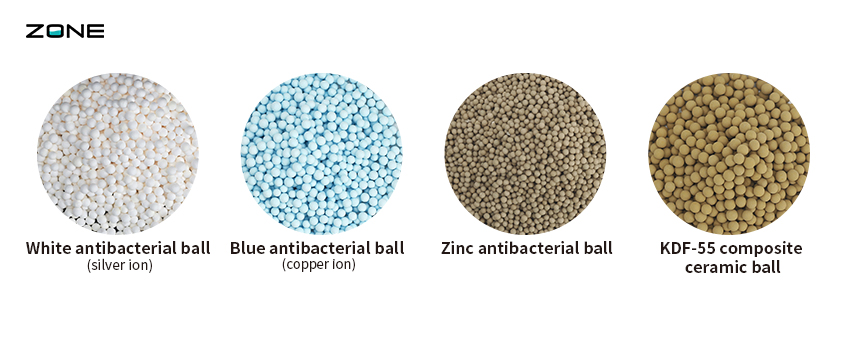How much do you know about antibacterial water treatment
Antibacterial water treatment refers to adding antibacterial agents to water or using antibacterial materials to kill or inhibit bacteria in water and prevent water pollution and disease transmission. Advantages of using ZONE antibacterial granule water treatment.
- The water quality can be improved to meet the standard of domestic, industrial or agricultural water.
- It can protect human health and prevent water-borne diseases, such as cholera, typhoid, dysentery, etc.
- It can prolong the storage period of water and prevent water from deteriorating and stink.
- It can save water resources, reduce water waste and repeated treatment.
- It can reduce the cost and energy consumption of water treatment, and improve the efficiency and effect of water treatment.

What kind of water needs antimicrobial treatment:
- The water source is polluted, and the water contains a large number of harmful bacteria or pathogens, such as surface water, shallow groundwater, domestic sewage, etc.
- The water quality is not up to standard, and the water contains microbial indicators exceeding the specified limit, such as total coliforms, Escherichia coli, Salmonella, etc.
- Water is stored for too long, and the bacteria in the water increase, resulting in water quality deterioration and odor, such as cisterns, water containers, tap water pipes, etc.
- Water has high requirements, and the water needs to be sterile or almost sterile, such as medical water, food water, pharmaceutical water, etc.
- Drinking water treatment: In order to ensure the safety and sanitation of drinking water, it is necessary to kill or remove harmful microorganisms such as bacteria, viruses, and fungi in the water. Commonly used methods include chlorine disinfection, ozone disinfection, and ultraviolet disinfection.
- Industrial water treatment: In order to ensure the quality and performance of industrial water, it is necessary to control or remove harmful microorganisms such as bacteria, algae, and fungi in the water. Commonly used methods include bactericidal algicide, magnetization treatment, precision filtration technology, and ultrafiltration technology wait.
- Sewage and wastewater treatment: In order to ensure the recycling or discharge standards of sewage and wastewater, it is necessary to degrade or remove harmful microorganisms such as bacteria, viruses, and fungi in the water. Commonly used methods include ozone treatment, ion exchange, ultraviolet treatment, and adsorption water purification technology wait.
- Desalination of seawater: In order to convert seawater into fresh water, it is necessary to remove harmful microorganisms such as bacteria, algae, and fungi in seawater. The commonly used methods include reverse osmosis membrane method and distillation method, and the reverse osmosis membrane method needs to add scale inhibition and slow release agents, detergents, etc.
RELATED NEWS
CATEGORIES
- Alkaline Water Media
- Fluoride Removal Products
- ORP Antioxidant Hydrogen Media
- Fluoride Removal News
- Remove Chlroine Media
- Antibacterial Media
- Mineral Water Media
- Remove Fluoride Media
- Antiscalant Media
- KDF Media
- Actived Water Media
- Purified Water Media
- Soften Water Media
- Condensate PH Neutralizer Media
- Activated Carbon Block Filter Media